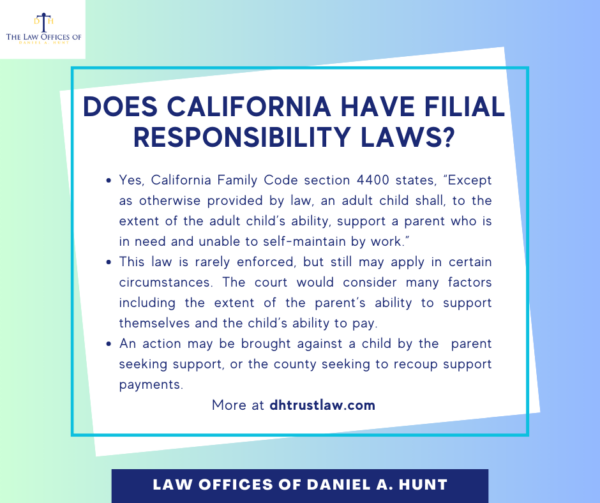Understanding Filial Responsibility Laws in California

Filial responsibility laws refer to the legal obligations imposed on adult children to financially support their aging parents. While these laws exist in 30 states across the United States, their application and enforcement vary widely. In this blog post, we’ll give an overview of filial responsibility laws in California.
What Are Filial Responsibility Laws?
Filial responsibility laws are statutes that mandate adult children to support their parents if they are unable to meet their basic needs due to age, disability, or illness. These laws are grounded in the idea that family members have a moral obligation to care for each other, especially in times of need.
California is one of 30 states with a filial responsibility law on the books. California Family Code section 4400 (“FC 4400”) states that, “Except as otherwise provided by law, an adult child shall, to the extent of the adult child’s ability, support a parent who is in need and unable to self-maintain by work.”
California’s filial responsibility law has been challenged on the grounds that it violates substantive due process and places an unenforceable burden on adult children to support their parents. This law is rarely enforced, but still may apply in certain circumstances.
Gluckman v. Gaines
In a case called Gluckman v. Gaines, the court held that enforcing filial responsibility is constitutionally permissible if the court considers the extent of the parent’s ability to support themselves and factors in the child’s ability to pay.
The legislature has codified the factors to be considered in determining whether an adult child is legally responsible for supporting their parent. The court looks at factors such as:
- The earning capacity of both parent and child
- The needs of each party
- The obligations and assets of each party
- The age and health of each party
- The parent’s standard of living
- Any other factors the court deems just and equitable
A child’s duty to support an impoverished parent is not absolute. It depends on the child’s ability to offer financial support and the extent of the parental support needs. A parent does not necessarily need to be destitute for a child to be required to support them, nor does a child need to be deemed wealthy to be required to support their parent.
Who Can Bring an Action?
You might be wondering who can bring an action against a child for parental support. According to Family Code section 4403, two classes of plaintiffs can bring an action:
- The county in order to recoup support payments made by county agencies to a parent who has a child that could have otherwise provided for their support
- A parent who is seeking support from their child.
A person legally acting on behalf of the parent could potentially bring an action as well. For example, a fiduciary like an agent under a Power of Attorney or a conservator could potentially initiate an action to seek support from an adult child.
Alternatives to Filial Responsibility Laws
Are there any alternatives to children paying for an elderly parent’s expenses? One common alternative is to use public assistance programs such as Medi-Cal, especially when paying for medical expenses, nursing homes, and long-term care facilities.
California families are encouraged to consult an estate planning lawyer to address long-term care needs. This planning may include trusts, wills, and other legal instruments that ensure the well-being of aging parents without imposing a financial burden on their children.
Financial Elder Abuse
Adult children sometimes not only neglect an indigent parent but also commit some form of elder abuse. This may involve stealing assets from an elderly person or using undue influence to coerce the person into making financial gifts or changing an estate plan to favor them.
An action seeking support under FC 4400 could be brought as an alternative to or in addition to a financial elder abuse claim. An experienced trust and estate litigation attorney can offer legal counsel and help you craft a legal strategy that is appropriate for your unique circumstances.
If you have any questions or need help understanding filial responsibility laws in California, feel free to contact our law firm.
Law Offices of Daniel A. Hunt
The Law Offices of Daniel A. Hunt is a California law firm specializing in Estate Planning; Trust Administration & Litigation; Probate; and Conservatorships. We've helped over 10,000 clients find peace of mind. We serve clients throughout the greater Sacramento region and the state of California.




